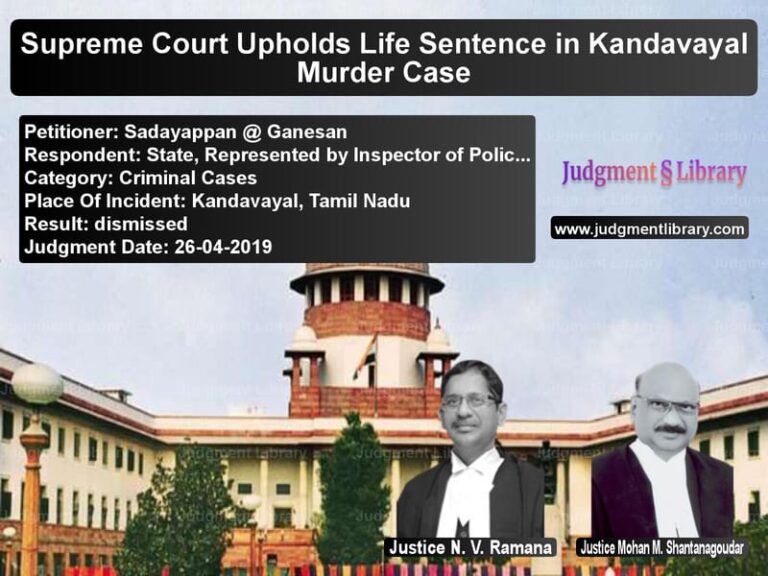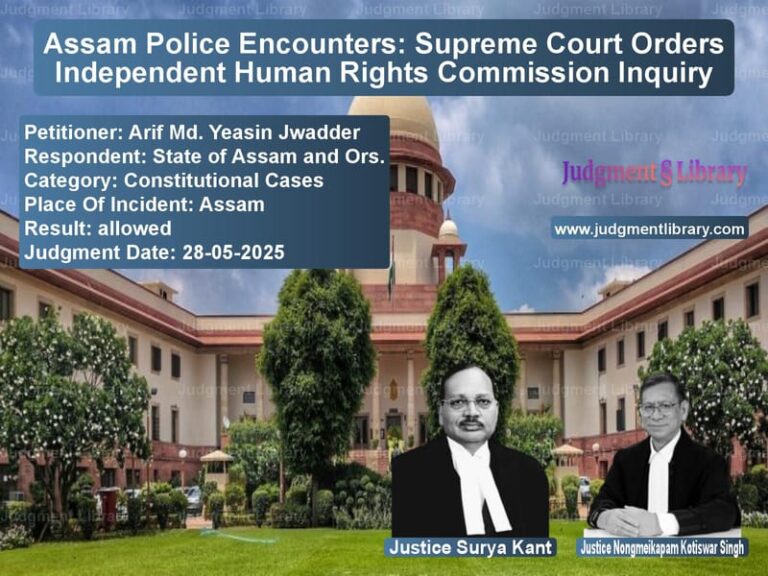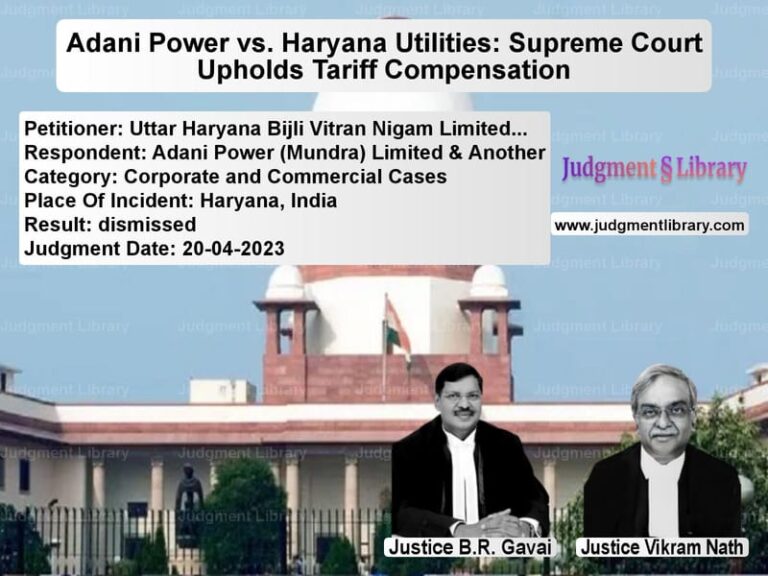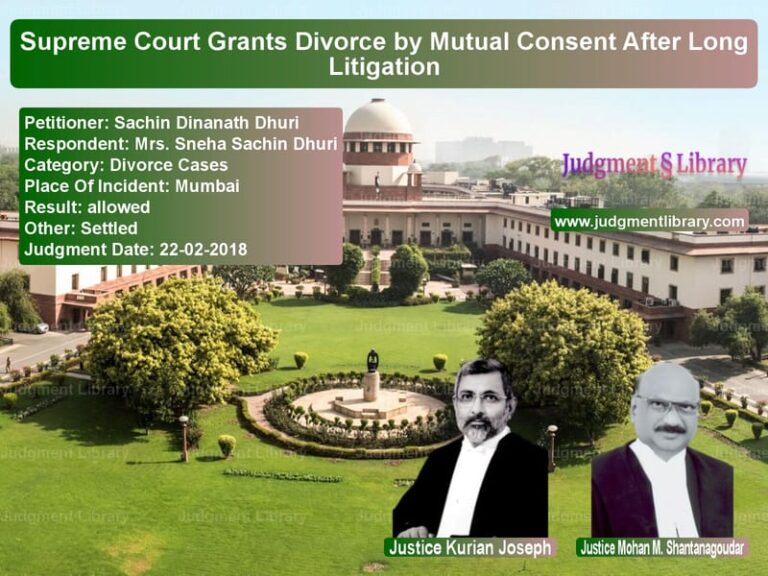State of Bihar vs. Pawan Kumar: Supreme Court Upholds Environmental Safeguards in Sand Mining
The case of State of Bihar & Ors. vs. Pawan Kumar & Ors. revolves around the legality of mining operations in Bihar and the environmental impact of sand mining. The Supreme Court examined whether the National Green Tribunal’s (NGT) orders restricting mining in the state were justified. The Court balanced the need for environmental protection with economic considerations and allowed temporary mining operations while ensuring compliance with environmental laws.
Background of the Case
The case originated from an order passed by the National Green Tribunal (NGT), Principal Bench, New Delhi, on October 14, 2020, in O.A. No. 40/2020/EZ and O.A. No. 57/2020/EZ. The order imposed restrictions on mining activities in Bihar due to concerns about illegal mining and environmental degradation.
The State of Bihar challenged this order in the Supreme Court, arguing that:
- The complete ban on mining was causing significant revenue losses.
- Illegal mining was increasing due to the lack of regulated operations.
- The government had already taken steps to ensure environmental compliance.
In response, the Supreme Court, on November 10, 2021, issued new directions allowing regulated mining under state supervision while environmental safeguards were implemented.
Petitioner’s Arguments
The State of Bihar, represented by Atmaram Nadkarni, argued:
- The ban on mining had led to an increase in illegal sand mining and lawlessness.
- Public infrastructure projects were being delayed due to a lack of legally available sand.
- The government had formulated a detailed plan for legal mining while ensuring environmental safeguards.
- Under the Supreme Court’s directions, mining operations had been temporarily resumed through the Bihar State Mining Corporation.
Respondent’s Arguments
The respondents, represented by Mukul Rohatgi and Prashant Bhushan, countered:
- Mining activities had caused severe environmental damage in Bihar, including riverbed depletion and deforestation.
- The state had not adequately addressed concerns related to illegal mining.
- The process of issuing District Survey Reports (DSRs) was flawed and lacked proper scientific evaluation.
- New mining permits should not be issued until a comprehensive environmental assessment was completed.
Key Observations of the Supreme Court
A bench comprising Justice L. Nageswara Rao and Justice B.R. Gavai made the following observations:
- The government’s concerns about revenue loss and illegal mining were valid.
- However, environmental protection was paramount, and mining operations could not continue unchecked.
- The preparation of District Survey Reports (DSRs) must be undertaken scientifically and transparently.
- Until the DSRs were finalized, mining could continue under strict environmental supervision.
Final Judgment
The Supreme Court ruled:
- The government could continue temporary mining operations through the Bihar State Mining Corporation.
- The DSRs must be finalized within six weeks and approved by the State Environmental Impact Assessment Authority (SEIAA).
- Any new mining permits would be subject to strict environmental regulations.
- Failure to comply with environmental safeguards would result in penalties and a potential halt in operations.
Implications of the Judgment
The ruling has several important implications:
- Balance Between Environment and Economy: The Court ensured that mining continued without causing excessive environmental harm.
- Stricter Environmental Oversight: The requirement to finalize DSRs and comply with SEIAA regulations strengthens environmental governance.
- Crackdown on Illegal Mining: By legalizing mining through the State Mining Corporation, the Court aimed to reduce illegal activities.
- Judicial Precedent for Future Cases: The ruling establishes guidelines for future conflicts between environmental protection and industrial activities.
Conclusion
The case of State of Bihar vs. Pawan Kumar highlights the complexities of balancing economic development with environmental sustainability. The Supreme Court’s ruling ensures that while the state can continue mining activities, it must do so responsibly and with proper safeguards in place. This decision serves as a crucial precedent for similar disputes across India.
Petitioner Name: State of Bihar & Ors..Respondent Name: Pawan Kumar & Ors..Judgment By: Justice L. Nageswara Rao, Justice B.R. Gavai.Place Of Incident: Bihar.Judgment Date: 18-01-2022.
Don’t miss out on the full details! Download the complete judgment in PDF format below and gain valuable insights instantly!
Download Judgment: state-of-bihar-&-ors-vs-pawan-kumar-&-ors.-supreme-court-of-india-judgment-dated-18-01-2022.pdf
Directly Download Judgment: Directly download this Judgment
See all petitions in Environmental Cases
See all petitions in Judgment by L. Nageswara Rao
See all petitions in Judgment by B R Gavai
See all petitions in partially allowed
See all petitions in Modified
See all petitions in supreme court of India judgments January 2022
See all petitions in 2022 judgments
See all posts in Environmental Cases Category
See all allowed petitions in Environmental Cases Category
See all Dismissed petitions in Environmental Cases Category
See all partially allowed petitions in Environmental Cases Category







